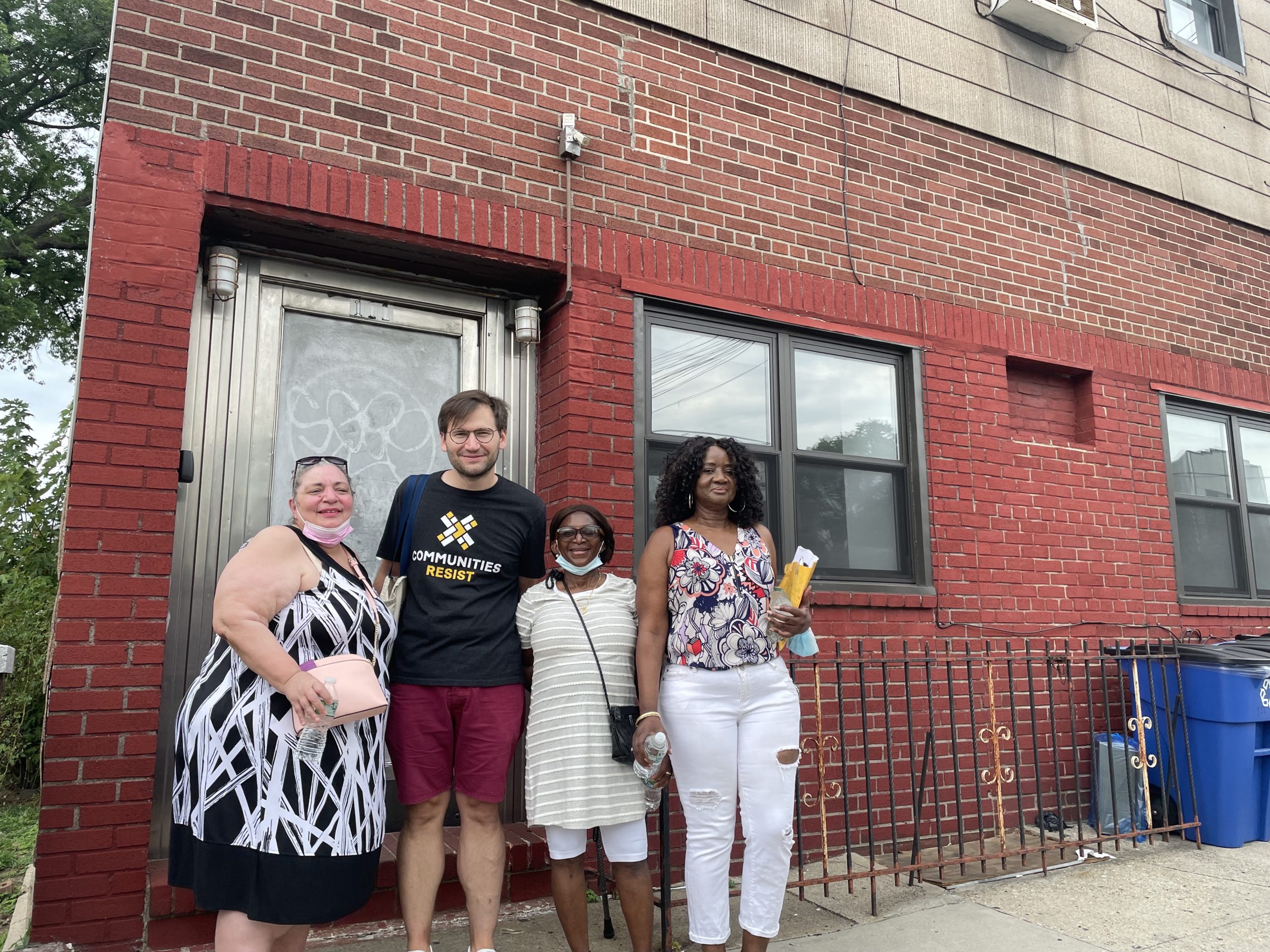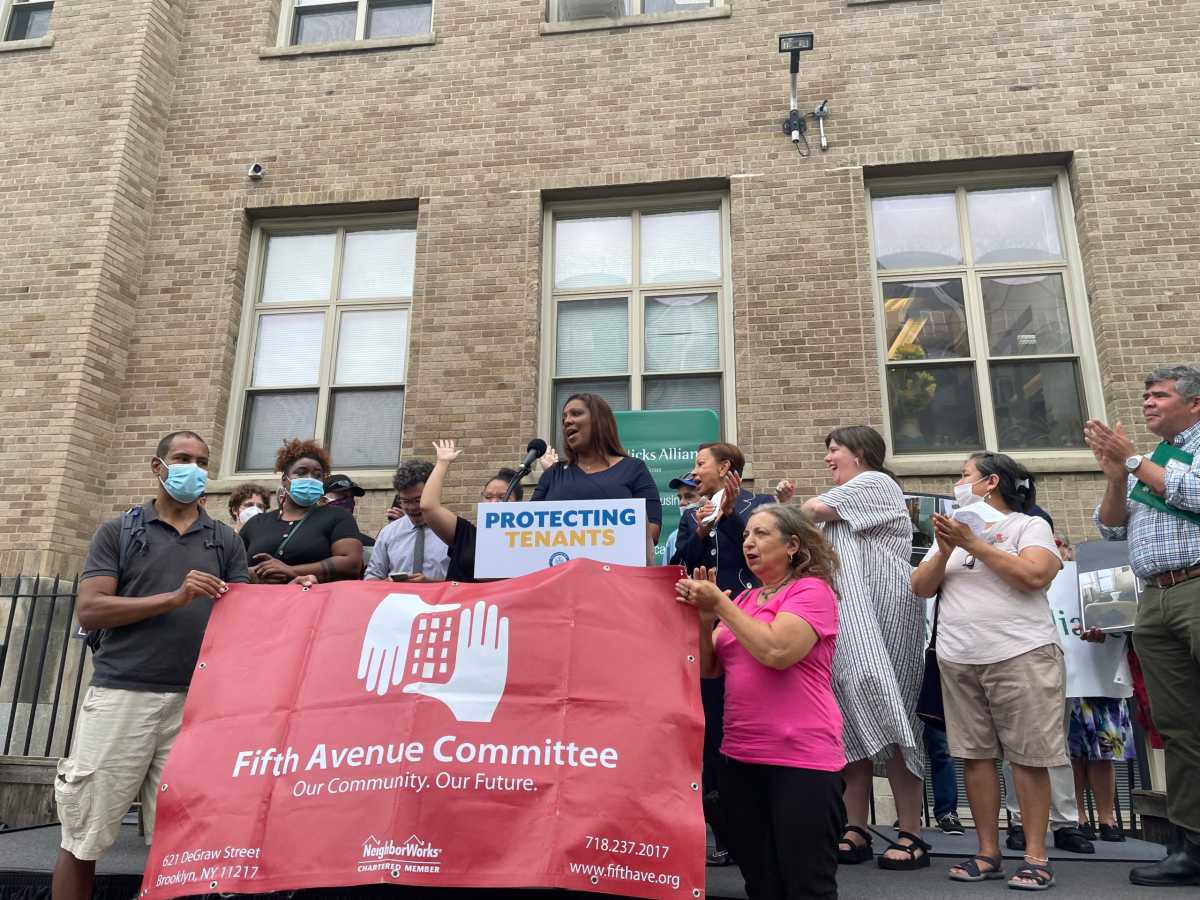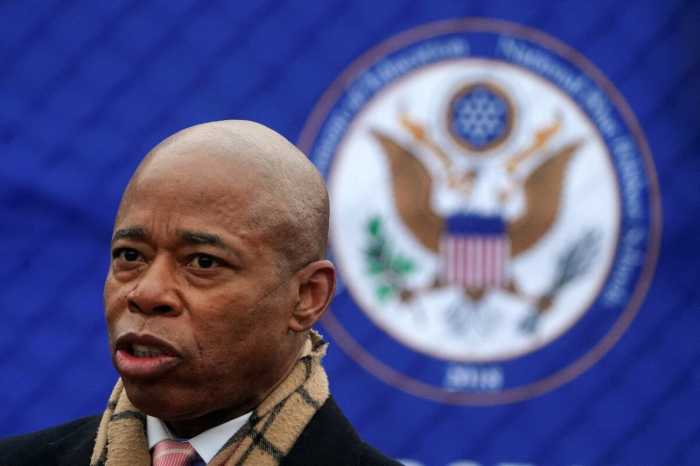New York Attorney General Letitia James and tenants residing in Ink Property Group LLC (Ink) buildings Friday announced a settlement agreement to stop Ink’s practices of harassing long-time tenants out of their homes in violation of rent stabilization laws.
As part of the settlement, Ink will pay up to $1.75 million to preserve affordable housing, and over $400,000 in restitution to tenants that will amount to $2,500 to each tenant forced to live in hazardous conditions intentionally created by construction. Ink will also bring at least 28 apartments that were illegally deregulated back into rent stabilization.
Ink is also required to install a monitor and external property management company to ensure compliance with rent stabilization laws and manage their buildings, which will be overseen by the Attorney General.
“I want to say that this is not just unique to Ink. We’ve seen this all over the city, and particularly in communities of color, and communities that are rapidly gentrifying,” said James who was joined by local lawmakers and several nonprofits property managers and developers.
According to the settlement agreement, between 2014 and 2019, Ink bought 32 multi-family buildings in New York City, most subject to Rent Stabilization, and immediately began a unlawful campaign to evict tenants in order to bring those units for sale at market-rate. After offering tenants illegal buy-outs, Ink began harassing the tenants who did not accept it. That harassment included daily door-knocking and intimidation where tenants were even fearful of leaving their apartments.
“And so this is a warning to all of those landlords, all of those developers, all of those speculators, that this attorney general, this congress member, these members of the City Council, as well as in the New York State Legislature, we’re looking out for you,” James said.
These advocates, including U.S. Rep. Nydia Velázquez (D-Brooklyn, Manhattan, Queens) and Assemblymember Emily Gallagher (D-Brooklyn), say the current state of housing unaffordability is guilty of exacerbating such despicable harassment tactics from landlord’s seeking to illegally profit.

Ink’s acquired the 32 properties out of the estimated 40 they own between 2014 and 2019 and although tenants weren’t informed of the change in ownership as legally required, they immediately noticed their rights were being violated. Three tenants living in Ink properties spoke in front of the crowd gathered at St. Nick’s Alliance in Williamsburg and two of them who reside at 111 Kingsland Ave in Brooklyn invited PoliticsNY to their homes afterwards with their attorney, Dennis Donnelly with Communities Resist.
“One of the biggest challenges for us and challenges for tenants is that often the law expects you to do a lot of different kinds of cases for different issues,” said Donnelly, explaining that nefarious landlords rely on a complicated legal system to discourage tenants from asserting their right.
“When you’re a tenant, it can be overwhelming, sometimes when you have professional help, much less for someone on their own to say, oh, I need to start this case for repairs in this case for discrimination and my landlord is also suing me and maybe I need to file another complaint with the state agency.”
Ink took over as owners of the building in 2017, and today only three of the original five families remain. The two units that have since been renovated that Ink planned to offer at market-rate are vacant, making it so two of the now five units are vacant.
On the way to the building, Judith Bailey explains if they do get someone to come fix an issue, it is “piecework and then they leave dust in the building, it’s filthy and dirty,” adding “mice come in and rats, we’re fighting with this rat, it was huge and you’re just scared.”
Both of the doors to enter the building do not lock and the buzzer system does not work. The entirety of the building’s inside infrastructure appears to be unstable and in disrepair – the walls in the first floor hallway bulges and the walls need new painting.
Ms. Bailey lives in her apartment with her three adult children who have helped document each request and every substandard or neglected repair. Her son, Justin, tells me they don’t have access to the basement, which is seemingly intentional and a problem when they experience a circuit break, lose their power and don’t have access to restart it.
Newly retired, Gladys Rodriquez, is neighbors with Bailey, and has lived at 111 Kingsland for 29 years and simply wants a safe home free of harassment. The latest repercussion of Ink’s neglect happened when Rodriquez tripped on one the floor’s broken titles, that are in desperate need of replacement, injuring her knee and now needs physical therapy to hopefully regain her full mobility.
Rodriquez began organizing in 2017 after she began experiencing unrelenting harassment and provided the OAG a letter a few years after that addressing Ink’s nefarious practices and read from that letter.
“If you find yourselves in a similar situation, do not be afraid to ask for help, you have a right to have an apartment and not be evicted because a new greedy landlord wants you to,” wrote Rodriquez who says that she still feels discouraged some days and wants to give up.
But that is not today. Although their legal proceedings for repairs are still ongoing and Ink is still refusing to provide them, Donnelly feels hopeful that they will ultimately be successful in forcing needed repairs with the added muscle of the settlement agreement and monitor’s oversight.










